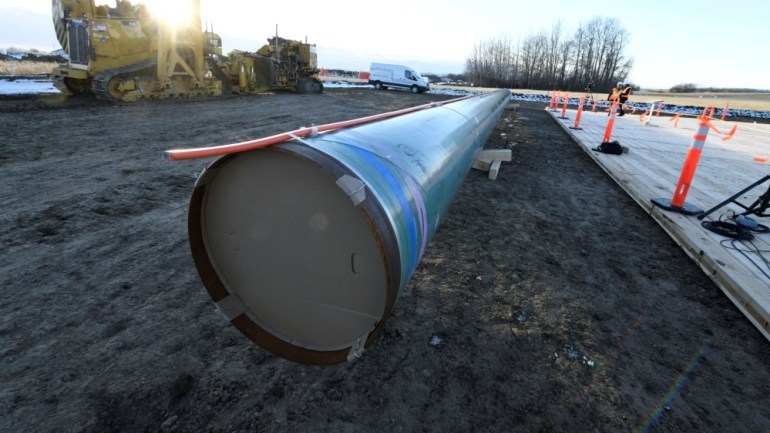[ad_1]
Canada’s contentious Trans Mountain pipeline is no longer profitable, a parliamentary budget watchdog has found, as the expansion project on the country’s west coast has faced years of delays, skyrocketing costs, and opposition from local communities.
In a report on Wednesday, the Office of the Parliamentary Budget Officer said the Canadian government’s 2018 decision “to acquire, expand, operate, and eventually divest of the Trans Mountain assets will result in a net loss for the federal government”.
“Trans Mountain no longer continues to be a profitable undertaking,” it said.
The report also estimated the costs that Canada could incur should construction be halted and the Trans Mountain expansion be cancelled indefinitely, saying Ottawa could be forced to write off $11.1bn ($14.4bn Canadian) in assets.
The Trans Mountain expansion project has been troubled from the start, as environmentalists and Indigenous communities along the pipeline’s route raised alarm at the harmful effects they said it would have on the environment and their way of life.
Despite legal challenges seeking to stop the plan from moving forward, Prime Minister Justin Trudeau defended the project, insisting that it will create jobs and generate funds that can be used to help Canada transition towards greener energy.
Trudeau’s government announced in 2018 that it was acquiring the expansion from its then-owner Kinder Morgan for $3.5bn ($4.5bn Canadian). The project was then approved in 2019, and construction is continuing.
Adrienne Vaupshas, a spokeswoman for Deputy Prime Minister Chrystia Freeland, told the AFP news agency on Wednesday that the project is “in the national interest and will make Canada and the Canadian economy more sovereign and more resilient”.
She cited independent analyses from BMO Capital Markets and TD Securities that concluded the project remains commercially viable at the higher costs.
The pipeline’s sale, Vaupshas added, will only proceed after further consultations with Indigenous groups and the risks associated with it are reduced.
The expansion would nearly triple the capacity of the pipeline, which has been in operation since the early 1950s, to allow it to ship as many as 890,000 barrels of oil per day from the Alberta tar sands to the coast of British Columbia for export overseas.
Trans Mountain Corp (TMC) said in February that it expected to complete the work in late 2023. It also said the cost had increased to $16.5bn ($21.4bn Canadian), up from $9.75bn ($12.6bn Canadian).

“The progress we have made over the past two years is remarkable when you consider the unforeseen challenges we have faced including the global pandemic, wildfires, and flooding,” said Ian Anderson, TMC’s president and CEO, said in a statement on February 18.
At the same time, the federal government said it would not spend additional public funds on the expansion. “TMC will instead secure the funding necessary to complete the project with third-party financing, either in the public debt markets or with financial institutions,” it said.
‘There will be no profits’
But environmentalists and other stakeholders said the increased costs were another reason for the Canadian government to cancel the expansion altogether.
“Trans Mountain never made any sense to build during a climate crisis,” Emma Jackson, a senior Canada organiser with environmental group 350.org, said in a statement in February.
“This is the moment to cancel this project outright and put all of our energy and political will into a just transition that leaves fossil fuels in the ground and supports people, communities and workers.”
On Wednesday, Julia Levin, national climate programme manager at Environmental Defence, echoed that, saying the project would cause “disastrous climate and environmental impacts” and harm Canadians.
“There will be no profits, only financial losses for Canadians and more carbon emissions for the planet,” Levin said in a statement.
“As the costs of the project keep ballooning, the government should cut its losses and cancel construction of the expansion pipeline – before even more of our dollars are wasted; public dollars that could be instead invested in developing sustainable energy systems.”
[ad_2]
Source link